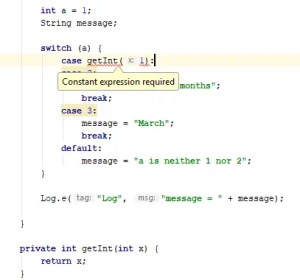Control flow: for, while, if, when
This post is for beginners who want to start learning Kotlin language and already know Java. We will show simple examples of for, while, if, when in both languages, in parallel, for an easier understanding. We will use Log.e in order to print string messages, as from our point of view, is easier to read them in the Logcat.
1. for loop
Enhanced For-Loop
Java
- inline
List<String> names = new ArrayList<>();
names.add("Laura");
names.add("Catalin");
names.add("George");
for (String name : names) Log.e("Names", "My name is " + name);
- using block
List<String> names = new ArrayList<>();
names.add("Laura");
names.add("Catalin");
names.add("George");
for (String name : names) {
Log.e("Names", "My name is " + name);
}
Kotlin
- inline
val names = listOf("Laura", "Catalin", "George")
for (name in names) Log.e("Names", "My name is $name")
Notice that in Kotlin we used a “$” symbol in order to obtain the value of name variable. This is called a template expression.
- using block
val names = listOf("Laura", "Catalin", "George")
for (name in names) {
Log.e("Names", "My name is $name")
}
Index-based loop
Java
List<String> names = new ArrayList<>();
names.add("Laura");
names.add("Catalin");
names.add("George");
for (int i = 0; i < names.size(); i++) {
Log.e("Names", "My name is " + names.get(i));
}
Kotlin
val names = listOf("Laura", "Catalin", "George")
for (i in names.indices) {
Log.e("Names", "My name is ${names[i]}")
}
Notice that here, we used beside “$” symbol, curly braces “{“. This was necessary because names[i] is an expression.
withIndex or Ranges loop
Java
List<String> names = new ArrayList<>();
names.add("Laura");
names.add("Catalin");
names.add("George");
for (int i = 0; i < names.size(); i++) {
Log.e("Names", "The name at " + i + " is " + names.get(i));
}
Kotlin
val names = listOf("Laura", "Catalin", "George")
for ((i, value) in names.withIndex()) {
Log.e("Names", "The name at $i is $value")
}
OR using Ranges (Kotlin)
for (i in 1..10) {
print(i)
}
2. while loop
The while loop in Kotlin is the same as the while loop in Java.
Both Java and Kotlin
var count = 1
while (count < 11) {
...
count++
}
3. if expression
Traditional usage
Java
int a = 1;
if (a < 0) {
Log.e("Log", "a is negative");
} else {
Log.e("Log", "a is positive");
}
Kotlin
val a = 1
if (a < 0) {
Log.e("Log", "a is negative")
} else {
Log.e("Log", "a is positive")
}
As an expression (inline if)
Java
int a = 1; String s = (a < 0) ? "a is negative" : "a is positive";
Kotlin
val a = 1 val s = if (a < 0) "a is negative" else "a is positive"
In both Java and Kotlin, if we use inline if, the “else” branch is required.
As an expression with blocks
Java
NONE
Kotlin
- 1 statement
val a = 1
val b = 2
val message = if (a < b) {
"a is min"
} else {
"b is min"
}
Log.e("Log", "message = $message")
The output for the above code will be:
E/Log: message = a is min
- 2 statements or more
val a = 1
val b = 2
val message = if (a < b) {
Log.e("Log", "a is min")
a
} else {
Log.e("Log", "b is min")
b
}
Log.e("Log", "min = $message")
The output of the above code is this:
E/Log: a is min E/Log: min = 1
What happens in this case? Well, a is indeed lower than b, so the code from the if branch will be executed. First, it will log the “a is min” message, and then a value will be assigned to “message” variable and the latest Log.e will log the message “min = 1” because a = 1.
As the official documentation states: ” if branches can be blocks, and the last expression is the value of a block”.
4. when expression
when expression in Kotlin is the equivalent of switch in Java.
General form
Java
int a = 1;
String month;
switch (a) {
case 1:
month= "January";
break;
case 2:
month= "February";
break;
default:
month= "this month is missing";
}
Log.e("Log", "month = " + month);
Kotlin
val a = 1
val month: String
when (a) {
1 -> month = "January"
2 -> month = "February"
else -> { // equivalent of "default" in Java. Note that it can be written as a block too!
month = "this month is missing"
}
}
Log.e("Log", "month = $month")
The output is:
E/Log: message = a is 1
Many cases that should be handled in the same way
Java
int a = 1;
String message;
switch (a) {
case 1:
case 2:
message = "first 2 months";
break;
case 3:
message = "March";
break;
default:
message = "a is neither 1 nor 2";
}
Log.e("Log", "message = " + message);
Kotlin
val a = 1
val month: String
when (a) {
1, 2 -> month = "first 2 months"
3 -> month = "March"
else -> { // equivalent of "default" in Java. Note that is written as a block!
month = "this month is missing"
}
}
Log.e("Log", "month = $month")
The output is:
E/Log: month = first 2 months
Arbitrary expressions (not only constants)
Java
In Java we can’t use arbitrary expressions. Constant expressions are required.
Kotlin
val a = 1
val month: String
when (a) {
1, 2 -> month = "first 2 months"
getInt(3) -> month = "March"
else -> { // equivalent of "default" in Java. Note that is written as a block!
month = "this month is missing"
}
}
Log.e("Log", "month = $month")
}
fun getInt(x: Int): Int {
return x
}
Check a value for being in or !in a range or a collection
Java
NONE
Kotlin
val a = 3
val month: String
when (a) {
in 1..3 -> month = "first trimester"
in 3..6 -> month = "second trimester"
!in 1..12 -> month = "outside of range"
else -> { // equivalent of "default" in Java. Note that is written as a block!
month = "this month is missing"
}
}
Log.e("Log", "month = $month")
The output is this:
E/Log: month = first trimester
Check that a value is or !is of a particular type
Java
NONE
Kotlin
val a = 3
fun isInt (a: Any) = when (a) {
is Int -> "a is Int"
else -> "is not an Int"
}
Log.e("Log", "message = ${isInt(a)}")
Output is:
E/Log: message = a is Int
Notice that in this scenario we assigned the value of when expression directly to the isInt function (method). This is one of the shorter ways of writing a function.
Replacement for an if–else if chain
Java
NONE
Kotlin
val a = 0
val message: String
when {
a > 0 -> message = "a is positive"
a < 0 -> message = "a is negative"
else -> message = "a is equal to 0"
}
Log.e("Log", "message = $message")
The output is:
E/Log: message = a is equal to 0
Note that in this scenario, when expression is followed directly by a curly brace “{“.

